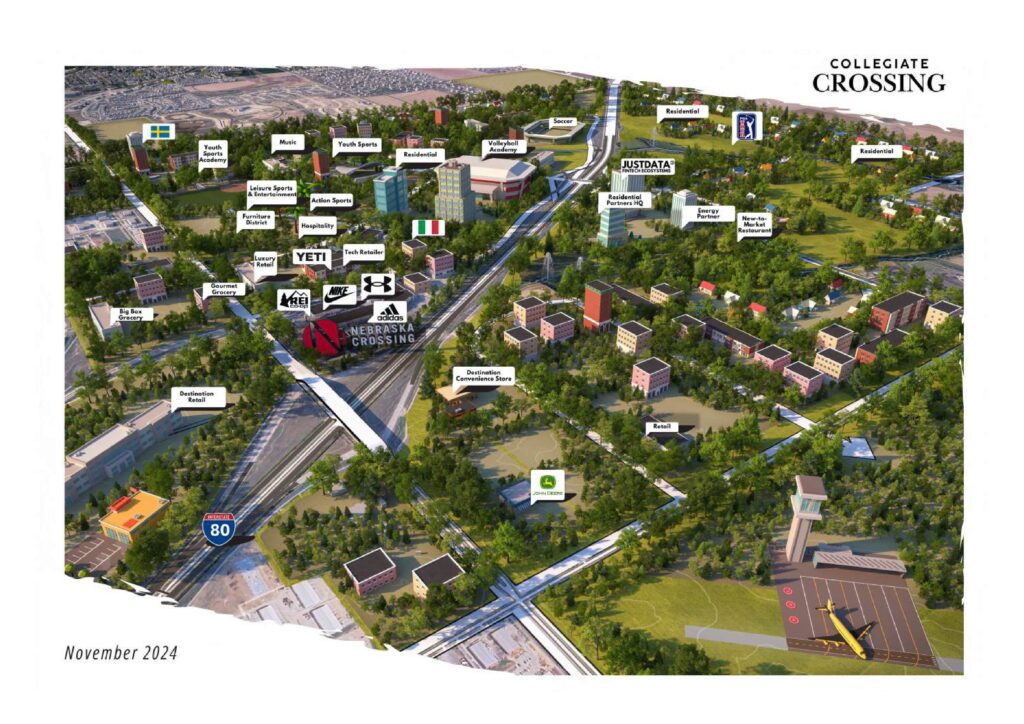Rod Yates has unveiled a grand vision for the “Good Life District” surrounding the Nebraska Crossing outlets in Gretna, Nebraska, now named “Collegiate Crossing.” This ambitious project, estimated to cost $5 billion and cover 4,500 acres, aims to create a vibrant hub blending youth sports and recreational activities reminiscent of Disneyland. Yates’s proposal includes state-of-the-art facilities for various sports, including indoor surfing, skydiving, rock climbing, and horseback riding. The project aims to attract high-school sports academies that can train students year-round while drawing attention from college recruiters, alongside professional sports teams and new retail options. Essentially, Yates envisions a transformative development that could redefine the region’s recreational and tourism landscape.
Despite the excitement surrounding this project, challenges have arisen in securing local government support. Yates has noted that the scale of his vision may exceed what any small town like Gretna can manage. He believes partnering with a larger governmental entity, such as the State of Nebraska, would be more appropriate, suggesting that the complexity and financial implications of the project warrant such a collaboration. Yates pointed out the difficulties in engaging with local officials, who, despite their support for the overarching vision, have shown hesitation regarding the specifics of Yates’s proposals. He expressed concern that the ongoing negotiations with the City of Gretna were taking too long and could unfairly burden local taxpayers.
City administrator Paula Dennison and Gretna Mayor Mike Evans have both indicated support for the Good Life District, but they have raised concerns about the vagueness and feasibility of the terms laid out by Yates’s team. Yates acknowledges these concerns, suggesting that he was attuned to the discomfort of local officials about the project’s vast scope. To advance Collegiate Crossing, Yates is considering changes in state legislation that would allow his team to work directly with the state or county governments, thereby gaining access to economic development incentives established for Good Life Districts. One significant incentive is a reduction in the state sales tax rates within the district, aiming to utilize the revenue difference for district development.
Currently, the sales tax rate has been reduced, but Yates highlighted that this has resulted in a loss of millions in potential revenue without any tangible development to show for it. His concerns are compounded by the lack of a suitable governmental partner to facilitate this funding mechanism, which has stymied progress on the project. A term sheet backed by Governor Jim Pillen and other state officials has been forwarded to the Gretna City Council, framing it as a signal of strong public support for the project. However, it remains uncertain whether local leaders will mobilize in support of Yates’s plans since they have yet to revisit any proposed legislative changes that would shift the development partnership from Gretna to a state-level framework.
As Yates continues to market Collegiate Crossing, he has noted significant interest from potential tenants, leading to an expansion of the proposed area from 2,000 acres to 4,500 acres. While Yates has secured preliminary agreements to purchase around 1,000 acres, he acknowledges that not all the land is currently under his ownership. The overwhelming response from national and international brands interested in establishing operations within the district underscores the project’s potential impact. However, securing a partnership with USA Volleyball to create a training center for its Olympic team has recently stalled due to personnel changes within the organization. Yates remains committed to the vision of Collegiate Crossing, which he believes is of paramount importance to bringing transformative industry, retail, and tourism to Nebraska.
In conclusion, Rod Yates’s vision for Collegiate Crossing exemplifies an ambitious attempt to redefine the Gretna area’s economic and recreational landscape. His proposal comprises a significant investment in sports, retail, and entertainment, with aspirations for the development to garner statewide significance. The biggest hurdles currently stand with local government negotiations, where concerns about project specifications and financial implications have obstructed progress. Yates’s plans to seek a shift to a state partnership highlight the complexities of such massive undertakings. With growing interest from potential tenants and a drive for legislative changes, Yates remains earnest about realizing his grand vision, projecting Collegiate Crossing as the new gateway to Nebraska’s future.

